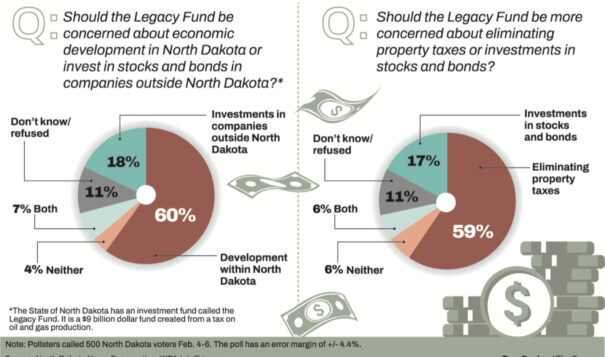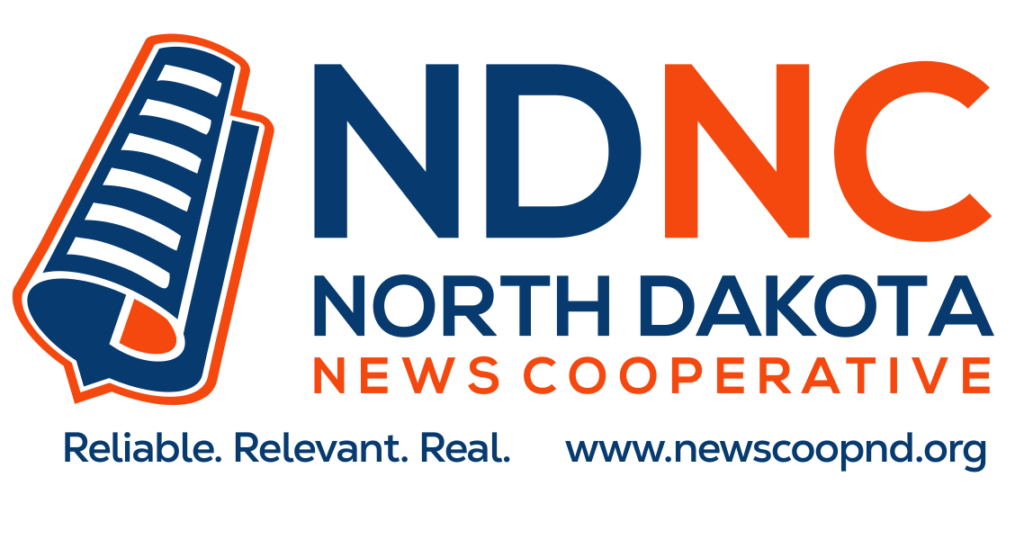News Based on facts, either observed and verified directly by the reporter, or reported and verified from knowledgeable sources.
Press Release
Voters want more say on use of Legacy Fund

Poll captures desire for transparency, better management, in-state investment
Eligible voters across North Dakota favor major overhauls in how the state’s Legacy Fund is managed and how its accumulating funds are used, a new North Dakota Poll conducted by the North Dakota News Cooperative (NDNC) found.
This includes changing where Legacy Fund investments are directed and increasing transparency over what’s sometimes called “the people’s fund.”
According to the poll, 60% of eligible voters want Legacy Fund investments to be directed to development projects in North Dakota versus 18% who want the fund to continue to focus mainly on growing through a return on investment.
A majority of 68% of voters also want Legacy Fund investments to be made “within the state of North Dakota” instead of following the current policy of putting most of the money into investments out-of-state or in foreign countries. Just 6% favored the status quo.
“These results leave no doubt. The people of North Dakota want major policy changes and they know what they want their sovereign wealth fund to be used for,” said Trevor Smith, the Chief Research Officer of WPA Intelligence, the national research firm that conducted the survey.
Much of the consternation appears directed at the State Investment Board (SIB), the body responsible for administering the fund.
This includes a desire for SIB to publish a list of Legacy Fund investments on its website and/or elsewhere instead of requiring citizens to file a formal request for such documentation. A total of 84% of eligible voters want such a list published, while 6% do not see a need for a published list.
“The voters want more transparency about the investments being made with their tax dollars,” said Smith.
Eligible voters also appear in the dark about the work SIB does in managing the Legacy Fund, with 75% unfamiliar with how it manages the fund, compared to 17% who had some level of familiarity. The board is currently chaired by Lt. Gov. Tammy Miller.
“This is an important government board but it’s a mystery to most voters,” said Smith.
Support for more transparency spans the political spectrum, with self-identified Republicans, Independents and Democrats all supporting the publication of investments at levels exceeding 80%.
Independent voters, who make up a third of the electorate, support publishing the investments by a margin of 88% to 5%. Additionally, voters with college degrees support this policy change by an 89% to 7% margin while those with a post-graduate degree support the change by a 91% to 3% margin.
“ND Poll results demonstrate that what the State Investment Board is doing and what the voters want them to do is emerging as an issue,” said Steve Andrist, co-chair of the NDNC.
The Legacy Fund, sometimes called a sovereign wealth fund and sometimes a “rainy day” fund, was created by a constitutional amendment initiated by the state legislature and approved by voters in 2010.
The current overall value of the Legacy Fund stands at around $9.8 billion.
A total of 30% of oil and gas gross production and oil extraction taxes on oil and gas goes toward the fund each month. An average of over $54 million has been deposited monthly over the past 12 years.
Since 2019, earnings from the Legacy Fund averaging around $500 million have been transferred to the legislature each biennium, based on a 7% of the valuation of the fund over a five-year average, for use with fixed-asset investments, infrastructure projects and stabilization deposits with the Bank of North Dakota.
“Our new poll has discovered a major disconnect between what the voters want from their Legacy Fund and what their public officials are doing with it,” said Jill Denning Gackle, an NDNC co-chair. “They are not making a connection with the Legacy Fund and their own lives or communities.”
The poll provided one question directly impacting the lives of people across the state, asking eligible voters whether the fund should be used for things like eliminating local property taxes in addition to focusing on a return on investments, with a margin of 59% to 17% in favor.
“These large margins tell me that the voters want the Legacy Fund to directly benefit themselves and their communities,” Smith said.
Looking ahead to the 2024 general election, the poll shows that voter interest is increasing, with those planning to vote rising to 78%, up from 71% in the previous ND poll taken last November.
The new North Dakota Poll surveyed 500 eligible and likely voters between February 4-6, 2024 and has a margin of error of +/- 4.4%. North Dakota News Cooperative is a non-profit news organization focused on reporting on topics that impact the lives of North Dakotans and promoting news literacy.
WPA Intelligence is a leading national provider of survey research, predictive analytics, and data management technology to assist in survey design, representative sampling, programming, fielding and data analysis.
North Dakota News Cooperative will have a follow up story on the Legacy Fund portion of the poll with comment from key people around the state following the official release of the data on Feb. 13.
A second release of data around questions on climate, environment and electric vehicle policy and awareness will come on Feb. 20.

The North Dakota News Cooperative is a non-profit news organization providing reliable and independent reporting on issues and events that impact the lives of North Dakotans. The organization increases the public’s access to quality journalism and advances news literacy across the state. For more information about NDNC or to make a charitable contribution, please visit newscoopnd.org.
